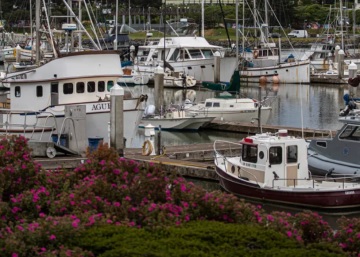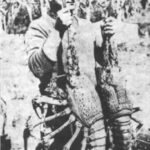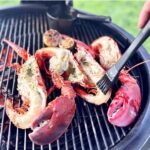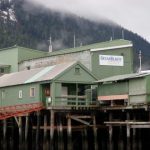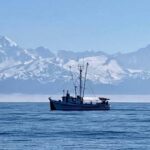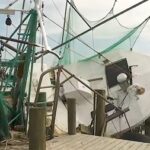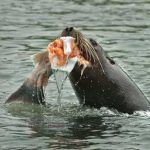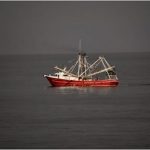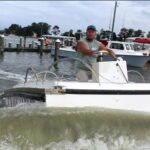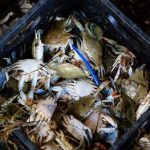Tag Archives: Yurok Tribe
Salmon Spotted in Klamath Basin for First Time in More Than a Century
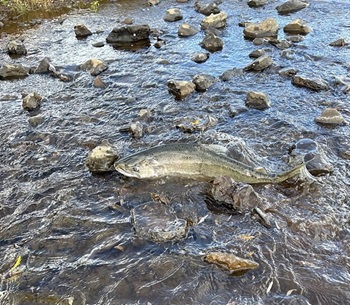 On Wednesday, an Oregon Department of Fish and Wildlife biologist spotted a first-in-a-century sight on a tributary to the Klamath River in the Klamath Basin: A fall-run Chinook salmon. Just weeks after the last remnants of the four hydroelectric dams that used to clog the lower Klamath River were hauled away, concluding what was the largest dam removal effort in United States history, the first salmon was spotted in the Klamath Basin area since 1912, when the first of the dams was installed, blocking fish passage to the hundreds of miles of historic habitat. Video, more, >>CLICK TO READ<< 10:40
On Wednesday, an Oregon Department of Fish and Wildlife biologist spotted a first-in-a-century sight on a tributary to the Klamath River in the Klamath Basin: A fall-run Chinook salmon. Just weeks after the last remnants of the four hydroelectric dams that used to clog the lower Klamath River were hauled away, concluding what was the largest dam removal effort in United States history, the first salmon was spotted in the Klamath Basin area since 1912, when the first of the dams was installed, blocking fish passage to the hundreds of miles of historic habitat. Video, more, >>CLICK TO READ<< 10:40
‘A massive enterprise’: California’s offshore wind farms are on a fast track
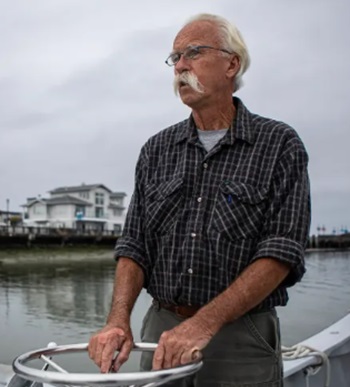 A new gold rush doesn’t begin to describe the urgency of harnessing wind off California when it comes to meeting climate goals. The first, substantial step has been taken: In December 2022, the federal government auctioned off 583 square miles of ocean waters off Humboldt Bay and the Central Coast’s Morro Bay to five energy companies — with more lease sales expected. The five wind farms will hold hundreds of giant turbines, each about 900 feet high, as tall as a 70-story building. But the still-evolving technology of floating wind farms makes it challenging to analyze the viability and impacts of these projects. Experts say a lack of existing data on potential environmental effects means that much of the scientific understanding will only begin after they are operating. A CalMatters analysis shows that California’s offshore wind projects carry a host of implications and uncertainties. Photos, more, >>CLICK TO READ<< 14:07
A new gold rush doesn’t begin to describe the urgency of harnessing wind off California when it comes to meeting climate goals. The first, substantial step has been taken: In December 2022, the federal government auctioned off 583 square miles of ocean waters off Humboldt Bay and the Central Coast’s Morro Bay to five energy companies — with more lease sales expected. The five wind farms will hold hundreds of giant turbines, each about 900 feet high, as tall as a 70-story building. But the still-evolving technology of floating wind farms makes it challenging to analyze the viability and impacts of these projects. Experts say a lack of existing data on potential environmental effects means that much of the scientific understanding will only begin after they are operating. A CalMatters analysis shows that California’s offshore wind projects carry a host of implications and uncertainties. Photos, more, >>CLICK TO READ<< 14:07
Tire toxicity faces fresh scrutiny after salmon die-offs
 For decades, concerns about automobile pollution have focused on what comes out of the tailpipe. Now, researchers and regulators say, we need to pay more attention to toxic emissions from tires as vehicles roll down the road. At the top of the list of worries is a chemical called 6PPD, which is added to rubber tires to help them last longer. When tires wear on pavement, 6PPD is released. It reacts with ozone to become a different chemical, 6PPD-q, which can be extremely toxic — so much so that it has been linked to repeated fish kills in Washington state. The trouble with tires doesn’t stop there. Tires are made primarily of natural rubber and synthetic rubber, but they contain hundreds of other ingredients, often including steel and heavy metals such as copper, lead, cadmium, and zinc. more, >>CLICK TO READ<< 17:07
For decades, concerns about automobile pollution have focused on what comes out of the tailpipe. Now, researchers and regulators say, we need to pay more attention to toxic emissions from tires as vehicles roll down the road. At the top of the list of worries is a chemical called 6PPD, which is added to rubber tires to help them last longer. When tires wear on pavement, 6PPD is released. It reacts with ozone to become a different chemical, 6PPD-q, which can be extremely toxic — so much so that it has been linked to repeated fish kills in Washington state. The trouble with tires doesn’t stop there. Tires are made primarily of natural rubber and synthetic rubber, but they contain hundreds of other ingredients, often including steel and heavy metals such as copper, lead, cadmium, and zinc. more, >>CLICK TO READ<< 17:07
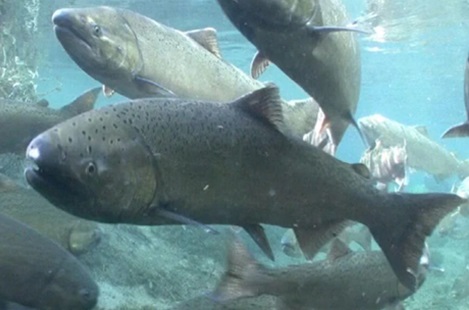
$20M+ in federal funds to California fisheries for disaster relief, $7M+ Oregon
More than $7,000,000 is going to Oregon fisheries as part of $42,000,000 in federal fishery disaster funding. Today, the U.S. Department of Commerce announced allocation of those funds for recovery from fishery disasters in Oregon, Alaska, California, Louisiana, Mississippi, and the Muckleshoot Indian Tribe and Yurok Tribe fisheries from 2017 to 2022. The federal funding will help ocean commercial fishermen in Oregon recover from significant economic losses in 2018, 2019, and 2020 from declining salmon populations. For California, U.S. Department of Commerce Secretary Gina Raimondo announced allocation of $20.6-million to address a fishery resource disaster that occurred in the 2023 Sacramento River Fall Chinook and Klamath River Fall Chinook Ocean and inland salmon fisheries. more, >>click to read<< 10:00
U.S. Department of Commerce allocates more than $42M in fishery disaster funding
 U.S. Secretary of Commerce Gina M. Raimondo announced today the allocation of more than $42 million to address fishery disasters that occurred in Alaska, California, Louisiana, Mississippi, Oregon and the Muckleshoot Indian Tribe and Yurok Tribe fisheries from 2017 to 2022. “Sustainable fisheries are essential to the health of our communities and support the nation’s economic well-being,” said Secretary Raimondo. “With these allocations, it is our hope that these funds help the affected communities and tribes recover from these disasters.” Today’s announcement applies to the following fishery disasters: Links, more, >>click to read<< 14:34
U.S. Secretary of Commerce Gina M. Raimondo announced today the allocation of more than $42 million to address fishery disasters that occurred in Alaska, California, Louisiana, Mississippi, Oregon and the Muckleshoot Indian Tribe and Yurok Tribe fisheries from 2017 to 2022. “Sustainable fisheries are essential to the health of our communities and support the nation’s economic well-being,” said Secretary Raimondo. “With these allocations, it is our hope that these funds help the affected communities and tribes recover from these disasters.” Today’s announcement applies to the following fishery disasters: Links, more, >>click to read<< 14:34
U.S. regulators will review car-tire chemical that kills salmon, upon request from West Coast tribes
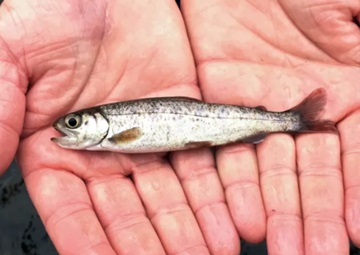 U.S. regulators say they will review the use of a chemical found in almost every tire after a petition from West Coast Native American tribes that want it banned because it kills salmon as they return from the ocean to their natal streams to spawn. The Yurok tribe in California and the Port Gamble S’Klallam and Puyallup tribes in Washington asked the Environmental Protection Agency to prohibit the rubber preservative 6PPD earlier this year, saying it kills fish — especially coho salmon — when rains wash it from roadways into rivers. Washington, Oregon, Vermont, Rhode Island and Connecticut also wrote the EPA, citing the chemical’s “unreasonable threat” to their waters and fisheries. >>click to read<< 10:14
U.S. regulators say they will review the use of a chemical found in almost every tire after a petition from West Coast Native American tribes that want it banned because it kills salmon as they return from the ocean to their natal streams to spawn. The Yurok tribe in California and the Port Gamble S’Klallam and Puyallup tribes in Washington asked the Environmental Protection Agency to prohibit the rubber preservative 6PPD earlier this year, saying it kills fish — especially coho salmon — when rains wash it from roadways into rivers. Washington, Oregon, Vermont, Rhode Island and Connecticut also wrote the EPA, citing the chemical’s “unreasonable threat” to their waters and fisheries. >>click to read<< 10:14
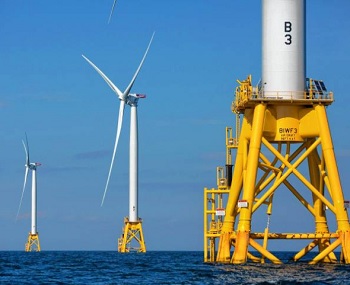
New California law aims to speed up offshore wind development
A law signed by California Governor Gavin Newsom on Saturday aims to speed up the process for new offshore wind development. The law requires California’s Coastal Commission to process consolidated permits for coastal development, which the law’s main sponsor says will streamline permitting. His district includes Mendocino, Trinity and Humboldt counties. McGuire said in a press release that this law will slash five years off the normal permitting timeline for offshore wind projects. He said it will help the state meet its goals in terms of climate change and renewable energy. >>click to read<< 09:31

CDFW INVESTS $17.5 MILLION IN THE KLAMATH BASIN
The California Department of Fish and Wildlife recently provided $17.5 million for the collaborative planning and implementation of three emergency projects that aim to restore critical salmon habitat, improve water management and make the Klamath Basin more resilient to climate change. “I would like to thank California Governor Gavin Newsom and Department of Fish and Wildlife Director Charlton Bonham for supporting our efforts to rebuild salmon runs on the Klamath River and its tributaries,” said Yurok Vice Chairman Frankie Myers. “I also want to acknowledge the diverse group of stakeholders working on these projects. Together, we are carving out a new path toward restoration in the Klamath Basin.” >click to read< 09:25
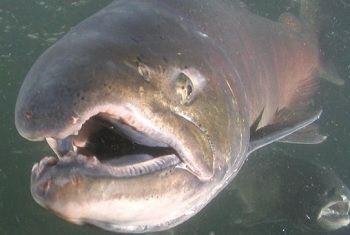
PFMC Recommends Commercial Chinook Fishery Closure in Northern California
The Pacific Fishery Management Council has recommended closing the commercial chinook fishery between the Oregon border and the Fort Bragg area due to low fall salmon returns forecasted for the Klamath River. Meanwhile, the recreational fishery will be open for chinook from June 29 through Aug. 1,,, These recommendations will take effect if adopted by U.S. Secretary of Commerce, Gina Raimondo,,, >click to read< 19:33

Declining salmon runs to restrict 2021 commercial season
During a press briefing on Friday morning, John McManus President of the Golden State Salmon Association said the added restrictions will deal a blow to commercial fishermen. “You may wonder why we’re in this predicament this year, there are some near term and some longer-term reasons why but at the end of the day, we’re seeing a decline in our salmon runs here in the state of California,”,,, Joe Conte said his biggest concern is losing more of his fleet. “I saw a lot of guys just kind of hang it up during crab season, a lot of guys saying they were gonna see how salmon turned out before they made some life decisions,” >click to read< 09:55
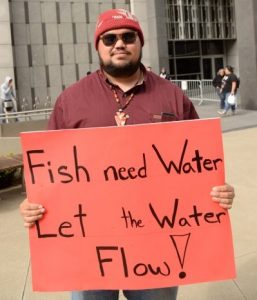
Yurok Tribe and Commercial Fishing Group, PCFFA, File Suit to Save Klamath Salmon
This afternoon, the Yurok Tribe and the Pacific Coast Federation of Fishermen’s Associations (PCFFA) filed a lawsuit against the Bureau of Reclamation and the National Marine Fisheries Service in response to low flows and high salmon disease rates under the federal agency’s new management plan for the Klamath River. The groups are represented by the environmental law firm Earthjustice. >click to read< 08:39
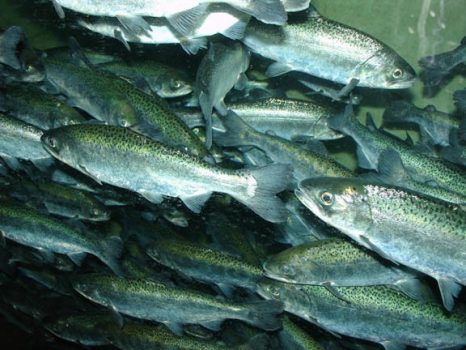
In ‘Crisis,’ Yuroks Suspend Commercial Salmon Season
For the second year in a row, the Yurok Tribe will not have a commercial fishery — a devastating blow to the tribe’s culture and economy. “We are in crisis mode,” said Yurok Tribal Chair Thomas O’Rourke in a press release that lamented poor conditions on the Klamath River that have led to historically low salmon returns. “The Klamath is our grocery store, our church and our main highway. It’s our lifeline. We will leave no stone unturned in search of additional short-term and long-term solutions to address the most terrible fisheries disaster in the Tribe’s history.” The release comes after the Pacific Fisheries Management Council released its predicted Chinook salmon returns for 2017 at 11,000 fish — the lowest on record — and the tribe’s fish harvest allocation at 650 fish, or one for every 10 tribal members. The predicted return comes after two years of disease outbreaks in juvenile fish due to low flows and elevated water temperatures in the Klamath River. continue reading the story here 13:44
Yurok Tribe Files Intent to Sue National Marine Fisheries Service and the Bureau of Reclamation
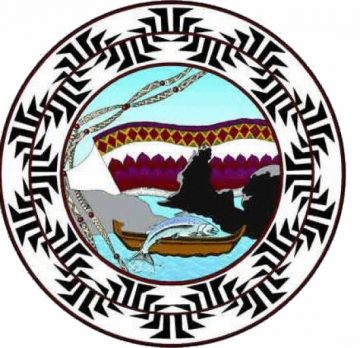 In response to massive fish disease outbreaks in back-to-back years on the Klamath River, the Yurok Tribe submitted a 60-day notice of intent to sue the National Marine Fisheries Service and the Bureau of Reclamation. “We cannot stand by and do nothing while our salmon hover over the brink of extinction,” said Thomas P. O’Rourke Sr., Chairman of the Yurok Tribe. “We will not continue to watch water managers jeopardize the fate of our fish and our river.” 91 percent of the juvenile, Klamath salmon were infected with a deadly parasite in 2015, as were a nearly identical number of fish in 2014. Given the nearly 100 percent mortality rate associated with the disease, approximately 90 percent of the Chinook salmon and likely an equal quantity of coho died in the main-stem Klamath River during those years, according to the notice. This year’s predicted adult salmon run is one of the lowest on record, which forced the Yurok Tribe to make a difficult decision to completely forgo all commercial fishing in 2016. Read the rest here 15:22
In response to massive fish disease outbreaks in back-to-back years on the Klamath River, the Yurok Tribe submitted a 60-day notice of intent to sue the National Marine Fisheries Service and the Bureau of Reclamation. “We cannot stand by and do nothing while our salmon hover over the brink of extinction,” said Thomas P. O’Rourke Sr., Chairman of the Yurok Tribe. “We will not continue to watch water managers jeopardize the fate of our fish and our river.” 91 percent of the juvenile, Klamath salmon were infected with a deadly parasite in 2015, as were a nearly identical number of fish in 2014. Given the nearly 100 percent mortality rate associated with the disease, approximately 90 percent of the Chinook salmon and likely an equal quantity of coho died in the main-stem Klamath River during those years, according to the notice. This year’s predicted adult salmon run is one of the lowest on record, which forced the Yurok Tribe to make a difficult decision to completely forgo all commercial fishing in 2016. Read the rest here 15:22







